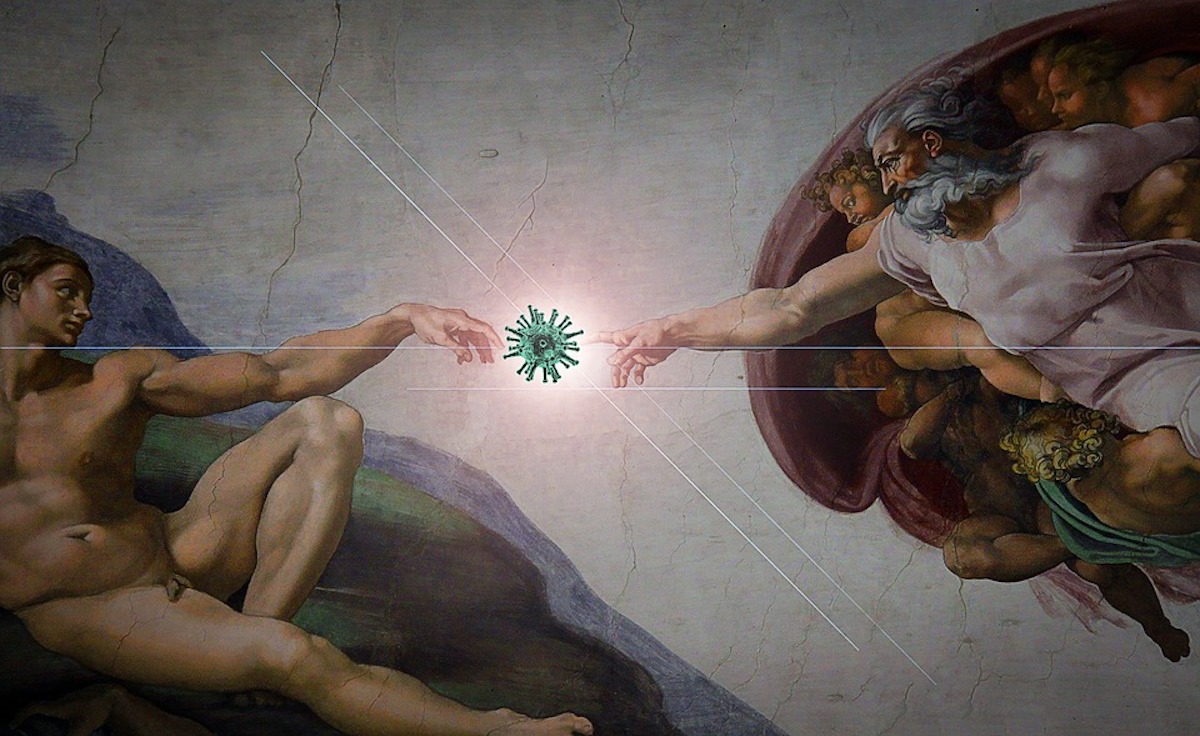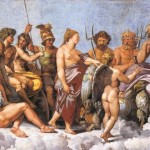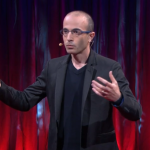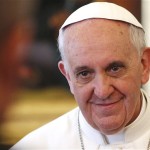Theism vs. Skepticism: The COVID-19 Pandemic
by Dr. Dennis Bonnette
Filed under Uncategorized

In an earlier Strange Notions essay, I addressed the problem of how an all-good God could be compatible with the existence of Hell. While that analysis befits the extreme case, the purpose of the present piece is to address the exact role of responsibility God has in terms of the very real and human tragedy posed by the Covid-19 virus which is presently raging throughout the world.
This piece will not address the most ethical or medically correct methods with which to address this pandemic. Rather, its sole purpose is to understand the role that God plays in allowing, supporting, and/or causing Covid-19’s enormous toll of pain and anguish on mankind.
Classical Theism's Defense of God's Goodness
In defense of God’s goodness, classical theists will point out that God is not a moral agent as mere creatures, such as men and angels are. As Creator, he is free to take back the gift of life he has given to men. Yet, it is also possible that the physical and moral evils we see in the world are caused by the actions of free creatures. Since God has chosen to create creatures with intellectual natures, both angelic and human, such beings are inherently free.1 With freedom comes the possibility of deliberate fault or sin. And thus, what God has created with perfection in the first place may become corrupted by free creatures’ misuse of their freedom. Such theological doctrines as original sin describe how free agents, such as human beings, could introduce real evil into a world originally created by God as good.
Evil that appears in the world may be (1) the result of a free agent’s misuse of freedom in a particular act that results in both his own corruption and evil effects that are of his making, (2) the result of some kind primeval fall by an angelic order of beings that infected the rest of subsequent creation, or (3) the product of a human original sin that perverted the natural goodness of later men and the order of nature itself. Some such scenario could be responsible for such natural physical evils as the Covid-19 pandemic together with all its suffering and death.
But skeptics rightly probe more deeply and ask precisely how God can be the ultimate cause of all things, and yet, claim no moral responsibility for something as horrific as the Covid-19 pandemic?
Thomists typically explain that creatures have genuine secondary causality, whereby their actions are properly their own, even though God sustains them in their execution. Thus, evil is introduced to the world either (1) through chance interactions of secondary causes, or else, (2) through the free agency of either angelic beings or men. In either case, the impression is given that evil’s responsibility is assigned to the secondary causes and not to God himself.
But is this the complete story? Surely, many natural agents appear to act to achieve something good for themselves. For example, a lion, seeking to eat, may interact with a gazelle, seeking to drink at an oasis, in a way much to the disadvantage of the gazelle. And, while neither lion nor gazelle is seeking anything evil, evil accrues to the gazelle as a result of their “chance” interaction. “Chance” events, in Aristotelian philosophy, do not mean events with no causation whatever, but something that happens outside the natural tendency of a given agent. Thus, while the gazelle goes to the oasis for water, its chance crossing of paths with the lion results in an unwanted outcome, namely, being eaten by the lion.
The bottom line of such causal confluence is that each agent, while acting so as to produce its own natural results (or, what Thomists argue are perfective ends), may well interact with other natural agents so as to produce an outcome outside the natural tendency of one, or both, agents involved.
Similarly, moral evils committed by free primeval angelic spirits and/or first true human beings might have introduced original disorder into creation, thereby explaining resultant cataclysmic physical and moral evils. While God is responsible for creating the perfection of such free agents in the first place, he is viewed neither as responsible for their misuse of freedom nor for the evil effects resulting therefrom.
But, do these typical explanations really entail that God in no way causes the evil we find in creation, especially as witnessed in a malevolent pandemic such as Covid-19? Quite to the contrary, God’s hand remains in every last detail of creation as is clear from the 1913 Catholic Enclycopedia explanation of Divine Providence:
“God preserves the universe in being; He acts in and with every creature in each and all its activities. In spite of sin, which is due to the willful perversion of human liberty, acting with the concurrence, but contrary to the purpose and intention of God and in spite of evil which is the consequence of sin, He directs all, even evil and sin itself, to the final end for which the universe was created.”
God not only causes the very being of all creation, but he keeps every particle of it in existence at all times. Moreover, as it changes and undergoes motion, God is the cause of the very existence of all that comes-to-be as new in finite reality.
This means that, while creatures, acting as secondary causes, are true causes of their own actions, such actions could never take place without God (1) sustaining the being of those agents and (2) also acting as the ultimate cause of every new quality of being that results from their actions.
The Nature and Role of Chance Events
As for chance events explaining evil in the world, many people do not realize that chance has two meanings: (1) an event taking place somehow spontaneously without any real cause, and (2) the classical Aristotelian notion of chance described above as something happening outside the natural tendency or intention of an agent.
Today, many people think of chance events as things happening without any real cause. Specifically, some interpret Heisenberg’s Indeterminacy Principle as meaning that there are subatomic events whose manifestation is not dictated by any actual cause. Other leading physicists, including Schrödinger and Einstein, maintained that this renunciation of deterministic causality was physically incomplete. Far more importantly, this denial of causality at the subatomic level is metaphysically impossible, since that would amount to having being come-to-be from non-being. Metaphysically, if “chance” means something happening without an actual cause, then there are no such “chance events” at all.
The other meaning of chance (described earlier) is philosophically tenable, since it merely refers to something interfering with an agent’s movement toward an expected outcome, whether the agent is intelligent or not. For example, one goes to the bank to make a deposit and accidentally meets a creditor who instead demands the money. Such an encounter of diverse causal orders would be called a chance event, but one whose outcome would in no way escape predictability to someone knowing the paths and intentions of both parties.
Similarly, a rock rolling down a hill encountering another rock that blocks its expected path would also be called a chance event, even though the outcome is perfectly deterministic in nature.
From the above, it should be clear that neither type of event called “chance” escapes the foreknowledge and will of God as described in Divine Providence, since (1) “chance events,” understood as being purely spontaneous or acausal simply do not exist and (2) God knows the tendencies and interactions of all agents. And, since all natural agents conform to the will of God in determining the course of causal events in creation, it is clear that God would be responsible for the course and outcome of all events, whether called “by chance” or not – barring, of course, interference by free creatures.
Still, Why Does God Enable Free Agents to Choose Evil?
Since most authors realize that the world as understood by classical metaphysics would flow deterministically from God if no free agents existed, the central thrust of explanations of evil focuses on the existence of such free beings. If free beings are really free, then it must be possible that they misuse their freedom, and thus, could introduce moral and physical evil into the world. From that initial appearance of free deviation from God’s plan of creation could then be explained the presence of subsequent physical and moral evils, whether they flow directly from evil choices, or, in some hypotheses, even by some sort of temporally antecedent effects anticipated by God’s eternal vision.
Therefore, while God does not directly cause such great evils as the Covid-19 pandemic, his creation of free beings – angelic or human – might explain how such evils come to be without having to blame God himself for consenting to these evils.
As noted earlier, the problem remains that no creature – not even a free one – can perform any act, whether it is viewed as secondary causality or not, without God sustaining its nature and enabling its activity. Thus, while God may not consent to or affirm the freely chosen evil intention of a free agent, he nonetheless sustains the activity of all the physical powers and actions by which an evil deed is performed. He may not will that the evildoer do evil, but he does permit and support all the physical powers by which the evil deed is committed – and even sustains the power of choice of the free agent in committing the evil deed.
I do not intend to argue here whether human freedom is possible, since that is a distinct issue which I have addressed elsewhere. The question at hand is why does God allow and support such evil choices and how is he not therefore responsible for their evil? And this is especially problematic in the case of explaining the connection between evil choices and the appearance of a blind, non-living, demonic virus, such as now plagues humanity.
Various hypotheses have been offered as to how creatures’ free choices might have resulted in evil entering the world. Theologically, Christians consider the possible effects of Lucifer’s rebellion or Adam’s original sin. Like a symphony orchestra whose conductor permits a small section to continue playing off tune, eventually the entire enterprise may go off tune – and, perhaps, there is a similar progressive cascade of moral evil precipitating ever greater physical and moral evils in the created world.
Even without some free creatures’ initial misdeed, perhaps, God created a world in which cosmic and biological evolutionary scenarios entail such “chance” interactions (in the Aristotelian sense described above) that physical evils result, as in the case of the lion surviving by eating a gazelle. In more dramatic terms, might God have planned a world in which earthquakes, volcanoes, and tsunamis would occur -- or even a Covid-19 virus would evolve -- for the greater good of reminding mankind that life is short and he still has need for his Creator?
In fact, this world might actually have been planned by God so as to enhance human freedom by making naturalistic evolution a plausible hypothesis for atheists who prefer not to believe in him!
“Since naturalistic evolutionism is the near-universal refuge of atheism, an evolutionary world becomes a world where persons experience maximum moral freedom, including freedom to deny God’s existence and moral law.”2
God may have many reasons to permit free choices which lead to real physical and moral evils. The principle here is that while an evil means is never permitted to attain a good end, nonetheless it is licit to permit evil to occur so that a good end is attained, provided one does not directly promote the evil means. This is like a father letting his young son smoke a cigar, not because he wishes him to smoke cigars, but because he knows that if the son gets really sick from smoking this cigar, he may learn not to smoke them in the future.
The key here is whether the father has the son’s true interest at heart and, analogously, whether God’s Providence always permits the introduction of evil into creation so as to attain some greater good as a result, for example, by creating conditions conducive to the raising up of the greatest saints, as I have suggested elsewhere:
“Free agents’ greatest qualitative perfection manifests when they choose moral good while self-deceptive evil beckons. Naturalism’s possibility, the unintended side effect of creature’ maximum secondary causality, offers illusory emancipation from moral constraint.”3
Thus, those who resist this atheistic self-deception and accept moral constraint can achieve a higher sanctity than if God’s existence was so manifest as to nearly force puppet-like obedience to the wisdom and justice of his commandments.
Why COVID-19 Does Not Tell Us Whether God Exists
The existence of a global pandemic, such as Covid-19, does not, in itself, determine whether such worldwide suffering and death proves or disproves God’s existence. This fact should be the key take away from this essay.
The key is to understand that an all-good and all-knowing God could have sufficient reason to permit the existence of such a grave evil as Covid-19 -- so that some greater good might be obtained. Why, then, is this not a sufficient explanation of the presence of Covid-19 in the world?
One must first grasp that to the agnostic, atheist, or skeptic the existence of an all-good, all-knowing God may simply not be viewed as a real rational possibility. I say this not to challenge such persons’ individual reasons for their rejection of all proofs for God’s existence. Rather, I am simply pointing out that the reason they see Covid-19 or any other massive form of human suffering as incompatible with the God of classical theism is not so much because of the inherent horror of the evil itself as it is because of the conviction that no God exists whose nature could possibly justify such evils. That is, in their worldview, there simply is no credible proof that an infinitely good and provident God is real. So, how could there be any rational justification for Covid-19 – not to mention Hell?
Conversely, the classical theist, who is convinced that the one, true God exists and that he is all-good and all-wise, can easily conceive that Divine Providence can know and will an end so good as to justify permitting the existence of virtually any evil imaginable. For, theists take seriously the infinity of God in every respect, and hence, would not dare to think that our finite knowledge of the situation can trump the knowledge and benevolence of what God intends.
That is why the question of whether one views Covid-19 or any other great evil as determinative of God’s goodness and power and knowledge depends, not so much on the nature of the finite evil at issue – not even of Hell itself, but upon one’s prior intellectual commitment as to whether or not God actually exists and whether he possesses the infinite perfections and attributes ascribed to him by traditional metaphysics.
In a word, I think that the fundamental distance between the way skeptics and theists look at reality as a whole helps explain why unbelievers see the Covid-19 pandemic as just one more proof that God does not exist, whereas believers understand that an all-loving God is reminding us that life in our modern technological age remains radically contingent and desperately in need of its transcendent Creator.
Related Posts
Notes:
Note: Our goal is to cultivate serious and respectful dialogue. While it's OK to disagree—even encouraged!—any snarky, offensive, or off-topic comments will be deleted. Before commenting please read the Commenting Rules and Tips. If you're having trouble commenting, read the Commenting Instructions.













